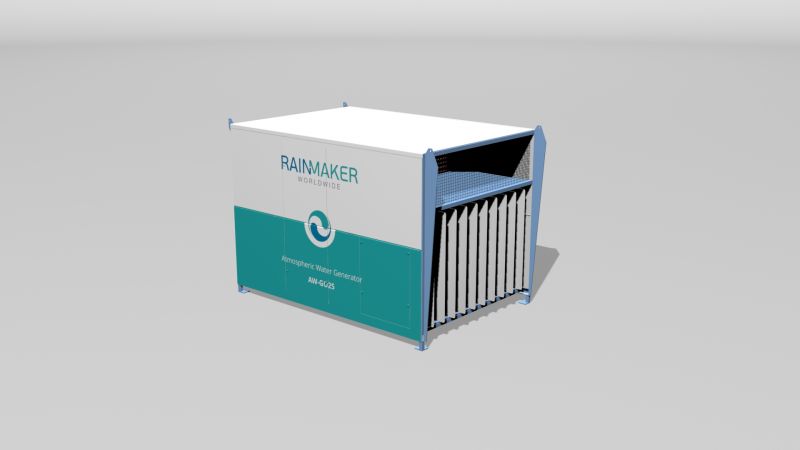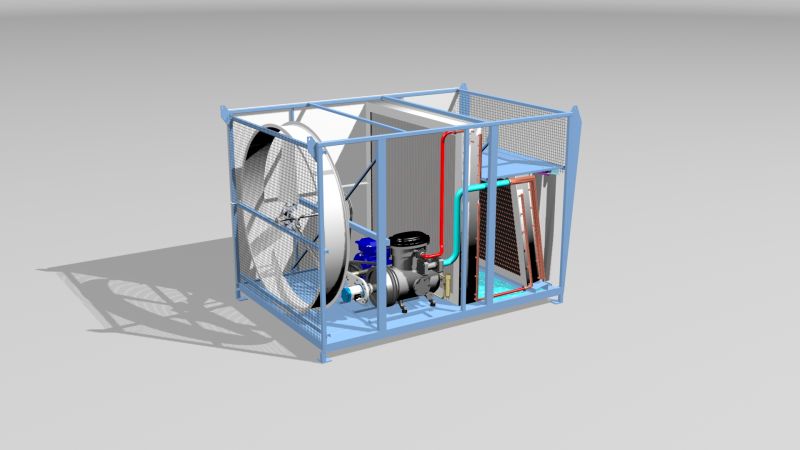Indian start-up to bring technology that could put an end to country's water woes
Kindle Ventures is planning to use a technology that can make up to 20,000 litres of water a day out of thin air.

During PM Narendra Modi's recent visit to Israel, one of the top concerns in his agenda was getting abundant and safe water for India. "I need more water, clean water. Where will I get it...," Israeli premier Benjamin Netanyahu quoted PM Modi as saying. The statement was possibly a reflection of the angst PM Modi is going through in tackling one of the country's biggest challenges — water shortage and the resultant farmer suicides.
The answer to PM Modi's problems could well lie back in his home country, where a new start-up named Kindle Ventures is planning to use a technology that can make up to 20,000 litres of water a day out of thin air!
India is an agrarian economy and yet one out of every 10 suicides that take place in the country is a farmer who gives up on life unable to make both ends meet. In what could act as a serious boon for the country which saw nearly 13,000 farmers commit suicide in 2015 (as informed by the government to the Supreme Court last month), a technology that churns out around 20,000 litres of fresh drinking water a day from out of thin air could mitigate regular threats of drought and fickle monsoon months.
Kindle Venture’s Green Solution:
This game-changing, commercially viable Dutch technology being brought to India by Kindle Ventures uses the concept of condensation to turn air into fresh water. The technology can be used in any terrain – however back of beyond like many parts of India – provided the minimum temperature of the area is more than 15 degrees centigrade.
 The core machine is expected to arrive in India by mid-August. (Image: Kindle Venture)
The core machine is expected to arrive in India by mid-August. (Image: Kindle Venture)
​The company's Chief Innovation Officer Gaurav Goenka has signed an MOU with Canadian owned Dutch company Rainmaker World Wide Inc, which holds the patent for this innovation. The core machine is expected to arrive in India by mid-August.
The air to water unit uses a turbine that forces air through a heat exchanger where the air is cooled and condensation takes place. Lowering the temperature of air requires minimal energy. When the temperature falls below its dew point, water droplets will form which are then collected in the water storage compartment. The actual amount of the water than can be produced depends on the average wind speed, the ambient temperature and the relative humidity. This “highly efficient” conversion process is applied via a patented “direct-drive” turbine which uses compressors that generate heat. This heat is then used to cool down large amounts of incoming air, which is displaced by using vents.
 This “highly efficient” conversion process is applied via a patented “direct-drive” turbine which uses compressors that generate heat. (Image: Kindle Ventures)
This “highly efficient” conversion process is applied via a patented “direct-drive” turbine which uses compressors that generate heat. (Image: Kindle Ventures)
Says Goenka, “I have entered into an agreement to test and modify this technology in harsh Indian conditions. I also intend to start a manufacturing plant in India in a joint venture with Rainmaker by the end of 2018. In the last century energy security was of vital importance for any country. Going forward, the same will apply to water security”.
Goenka says the technology has already garnered massive interest from state governments which are fighting drought and lack of clean water.
Once the technology arrives in August, he will travel to states which are facing the most acute shortage of water to demonstrate the technology.
“Under the PM's leadership, India is seeing a tidal wave of new innovations and start-ups. I wanted to be part of a start-up that could serve India’s common people. India has a huge water shortage and rapid urbanization is causing serious water stress for its already depleting reserves. If large cities don’t have water which is the story in many such Indian cities, imagine what must be happening in India’s backward villages,” Goenka says. He adds that if India seriously plans to be part of the three biggest economies of the world in the near future, it has to ensure water security as a priority. So will the technology require electricity to run?
Goenka says no. “I don’t need electricity. The technology has been developed keeping in mind lack of power sources. Hence it can run with solar and wind energy.” The company is planning to mount the technology and take it to states like Maharashtra, Bengal, Andhra Pradesh and Gujarat for demos to state governments.
“The machine requires a minimum of 15 degrees to make water. I have signed an MOU to bring the core technology to India and not the turbine. I intend to make the turbine in India itself,” Goenka adds.
Rainmaker was recently awarded as a Top 10 Green Solution in Slovenia recently. The Air to Water solution is 100 per cent sustainable and leaves no damaging footprint where it is placed; running completely on renewable energy. This cost-effective solution, that comes between the range of Rs 20L and 3 crore, has the potential to change the world, especially in dry areas where there is a lack of rain.
The Centre recently informed the Supreme Court that over 12,000 suicides have been reported in the agricultural sector every year since 2013. The Centre said that a total of 12,602 persons involved in farming sector - 8,007 farmers-cultivators and 4,595 agricultural labourers - committed suicide during 2015, accounting for 9.4 per cent of total suicide victims (133,623) in the country.
Maharashtra topped the list with 4,291 suicides, followed by Karnataka with 1,569, Telangana 1,400, Madhya Pradesh 1,290, Chattisgarh 954, Andhra Pradesh 916 and Tamil Nadu 606. Together, these seven states accounted for 87.5 per cent of total suicides in the farming sector in the country - 11,026 of 12,602.
In 2014, 12,360 persons in the farming sector - 5,650 farmers-cultivators and 6,710 agricultural labourers -committed suicide. In 2013, the number was 11,772.
So what made Goenka decide to work with water?
“Because of lack of innovation and lack of clarity on policies, companies didn’t look at developing such path-breaking green technologies. Backed by a large private equity fund, Rainmaker has developed this unique and commercially expandable concept and proved how it can be successfully used in countries like India and Africa. The technology Air to Water has already been installed in Kuwait, Netherlands and the Caribbean. I am bringing it to India,” Goenka added.
India has the world’s highest number of people without access to clean water — imposing a major financial burden for some of the country’s poorest people.
Around 75.8 million Indians — or 5 per cent of the country’s 1.25 billion population — are forced to either buy water at high rates or use supplies that are contaminated with sewage or chemicals. That accounts for more than a tenth of the 650 million people worldwide without clean water access — more than any single country in Africa or China, where 63 million have no access.
The rapid growth of population and its growing needs has meant that per capita availability of fresh water has declined sharply from 3,000 cubic metres to 1,123 cubic metres over the past 50 years. The global average is 6,000 cubic metres. One in 10 people globally are trapped in a cycle of poverty and disease for want of a safe, affordable water supply of their own.

